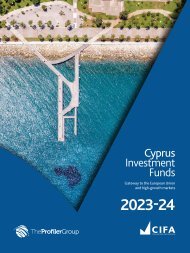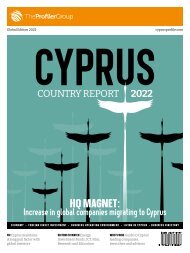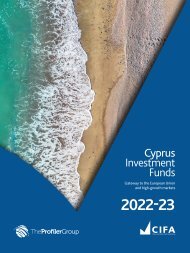2020 Cyprus Country Report
The 2020 Cyprus Country Report features in-depth articles on the economy, foreign direct investment, international trade and headquartering as well as detailed sector profiles and insights from Cyprus’ 100 most influential political, economic and business leaders shaping the future of their country and its industries.
The 2020 Cyprus Country Report features in-depth articles on the economy, foreign direct investment, international trade and headquartering as well as detailed sector profiles and insights from Cyprus’ 100 most influential political, economic and business leaders shaping the future of their country and its industries.
You also want an ePaper? Increase the reach of your titles
YUMPU automatically turns print PDFs into web optimized ePapers that Google loves.
Travel & Living<br />
<strong>Country</strong>Profiler<br />
Essential<br />
Expat Guide<br />
<strong>Cyprus</strong> is a top tourist destination for all<br />
seasons, and one of Europe’s hot spots<br />
for expats thanks to its thriving economy<br />
and relaxed Mediterranean lifestyle.<br />
COUNTRY<br />
Located in the Eastern Mediterranean at the crossroads of Europe,<br />
the Middle East, Asia and Africa, <strong>Cyprus</strong>’ strategic position has<br />
played a key role in shaping its history and in developing the<br />
island into a centre for trade and international business. <strong>Cyprus</strong><br />
enjoys around 340 days of glorious sunshine a year and boasts a<br />
coastline teeming with endless stretches of golden sands, secluded<br />
bays and rocky coves. Surrounded by the crystal-clear waters of<br />
the Mediterranean Sea, the island is dotted with the fascinating<br />
remains of history from Neolithic settlements and ancient citykingdoms<br />
to exquisite Byzantine art and magnificent Venetian architecture.<br />
<strong>Cyprus</strong> is known for its hospitality – filoxenia – a fact<br />
reflected in the Greek word xenos which is used for both guest and<br />
stranger. Life is meant to be enjoyed in <strong>Cyprus</strong>, where emphasis is<br />
put on working to live, as opposed to living for work. Café culture<br />
predominates, with both business and social meetings taking place<br />
over a leisurely iced coffee frappé in the numerous cafes in every<br />
town and city.<br />
HISTORY<br />
<strong>Cyprus</strong> has been coveted, conquered and colonised numerous<br />
times during its 10,000-year history. The island attracted the interest<br />
of a succession of dominant powers in the region, which battled<br />
for it through the millennia. The first of these are believed to have<br />
been the Achaean Greeks who arrived in around 1200 BC introducing<br />
their language, religion and customs to the island. <strong>Cyprus</strong><br />
was subsequently colonised by the Phoenicians, the Assyrians,<br />
the Egyptians and the Persians. In the 4th century BC Alexander<br />
the Great claimed the island, which remained part of the Greek-<br />
Egyptian kingdom until 30 BC, when the Romans arrived, and<br />
<strong>Cyprus</strong> became a senatorial province. It was during this period<br />
that Saint Paul was said to have visited the island and converted<br />
the Roman governor to Christianity. <strong>Cyprus</strong> remained a Roman<br />
possession until the empire began to disintegrate in 330AD, when<br />
it became part of the Eastern Roman or Byzantine Empire.<br />
In 1191, <strong>Cyprus</strong> was conquered by the English king, Richard<br />
the Lionheart, while on his way to take part in the Third Crusade.<br />
He later sold the island to the Knights Templar, who consequently<br />
sold it on to the Franks or Lusignans, a dynasty which went on to<br />
rule <strong>Cyprus</strong> for almost 300 years, until the last of the Lusignans<br />
ceded the island to Venice in 1489. Despite building heavy fortifications<br />
around the island’s major cities of Famagusta and Nicosia,<br />
the Venetians were not able to withstand the invading Ottoman<br />
troops who conquered the island in 1571. <strong>Cyprus</strong> remained under<br />
Ottoman rule until the arrival of the British in 1878.<br />
The island’s long history offers visitors a journey of discovery<br />
paved with ancient archaeological treasures. The ancient citykingdoms<br />
of Kourion and Amathus, and the Mosaics of Paphos,<br />
are considered among the finest mosaic floors in the Eastern<br />
Mediterranean. Other must-see historic sites include the Neolithic<br />
settlements of Choirokoitia and Kalavasos-Tenta, the Tombs of<br />
the Kings and the famous Sanctuary of Aphrodite, the Goddess of<br />
Love, who legend claims was born on this island.<br />
In more recent times, <strong>Cyprus</strong> gained independence from<br />
Britain in 1960, however a Greek sponsored coup d’état in 1974 was<br />
swiftly followed by an invasion of Turkish forces which occupied<br />
the northern one-third of the island. Despite numerous efforts over<br />
the intervening decades, the island remains de facto divided, and<br />
the self-declared Turkish Republic of Northern <strong>Cyprus</strong> (TRNC)<br />
remains unrecognised by the international community. The Greek<br />
Cypriot and Turkish Cypriot leaders continue to look for a solution<br />
to end the division of the island, but while negotiations have<br />
been slow, some progress is being made. The capital city, Nicosia,<br />
is still split between the two sides, though visitors can access either<br />
side from checkpoints at Ledra Palace and Ledra Street, and today<br />
Nicosia is the last remaining divided capital city in the world.<br />
158 <strong>Country</strong> <strong>Report</strong> CYPRUS <strong>2020</strong>

















